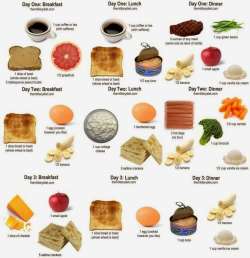5 Myths about Military Diet busted
The military diet is a low-calorie weight loss diet

Military diet is currently one of the most popular form diet programmes. Military Diet is a three-day diet programme. Experts says that it helps you to lose up to four to five kilograms of weight within a week, and that too for free. It doesn’t require you to buy any kind of book, expensive food or supplement. The military diet is a low-calorie weight loss diet that is claimed to promote significant weight loss in just one week which is known by several other names including the navy diet, the army diet and even the ice-cream diet.
Mehar Rajput, dietician and nutritionist, FITPASS, an app for fitness enthusiasts, and Sonia Narang, dietician at New Delhi's Sonia Narang's Diet and Wellness clinic, have busted a few myths about the military diet:
* Myth 1: You are on diet for only three days.
Fact: This isn't true. Though the diet plan is designed for three days, you continue observing your calorie intake for the remaining days of the week. This practically keeps you on a diet for all the seven days of the week. Though the first three days put you through a strict and controlled diet, the other four days are not cheat days. You need to eat in moderation, though this may result in mood swings due to low calorie intake.
* Myth 2: You don't count calories in this diet.
Fact: Whether it is a three-day diet programme or the rest of the four days of the week, you should eat in moderation. If you are switching one type of food with another, for instance salmon with a lean protein or non-vegetarian with a vegetarian one, you need to make sure the calorie intake is the same.
* Myth 3: This diet speeds up your metabolism.
Fact: Diet alone can't do that for you. Along with diet, you need to exercise regularly. There are stimulants like caffeine that can speed up the metabolism but that is for a short span of time.
* Myth 4: Nutrition experts develop this diet.
Fact: No one knows accurately about the root base of the Military Diet. Nevertheless, sources suggest that the design of the Military Diet came from junk mail, bulletin board, faxed from one person to another and word-of-mouth.
Fact: It is not low-fat, low cholesterol, or a low-salt diet and it is only a low-calorie diet. As a result, it is not a healthy and balanced choice for most people with specified problems including high cholesterol, hypertension, diabetes and heart disease.